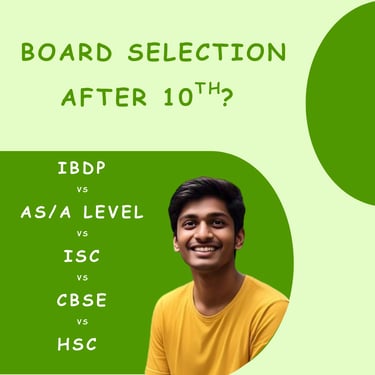The Great Dilemma: IBDP vs. A levels vs. ISC vs. CBSE vs. HSC board comparison in India after 10th.
Choosing the Right Curriculum for Class 11th and 12th in India: IBDP vs. A levels vs. ISC vs. CBSE vs. HSC board comparison in India after 10th. Let’s break down the nuances of each board, exploring their pros, cons, and key differences, to help you make an informed decision.
SCHOOL EDUCATION AND BOARD EXAMS
Article by Mr. Farzad Minoo Damania - Career Counsellor in Mumbai
3/23/2025


The Great Dilemma: Choosing the Right Curriculum for Class 11th and 12th in India
IBDP vs. AS/A levels vs. ISC vs. CBSE vs. HSC board comparison in India after 10th.
Introduction:
The transition from class 10th to higher secondary school is a pivotal point in any student’s academic journey. With an array of curricula available in India—ranging from globally recognized IBDP and AS/A Levels to Indian boards like CBSE, ISC, and HSC—the choice can feel overwhelming. How do you decide which one aligns with your ambitions, interests, and learning style? Let’s break down the nuances of each board, exploring their pros, cons, and key differences, to help you make an informed decision.
1. International Baccalaureate Diploma Program (IBDP)
The IBDP is an internationally acclaimed, two-year pre-university program that focuses on interdisciplinary learning, skill development, and holistic education. It’s designed to shape globally-minded, research-oriented students.
Pros of IBDP:
Global Recognition: Renowned by top universities worldwide, especially in the US, UK, and Europe.
Comprehensive Skill-Building: Incorporates Creativity, Activity, Service (CAS), the Extended Essay (EE), and Theory of Knowledge (TOK) to nurture research, critical thinking, and time-management skills.
Interdisciplinary Learning: Encourages connections between subjects, fostering a well-rounded academic foundation.
Focus on Extracurriculars: CAS provides ample opportunities to pursue interests beyond academics.
Cons of IBDP:
Demanding Curriculum: Students must manage a diverse workload, including projects, essays, and extracurricular activities.
Cost Factor: Significantly more expensive than Indian boards.
Limited Accessibility: Offered primarily in international schools in metropolitan areas.
2. Cambridge International AS/A Levels
Known for their academic rigor, AS (Advanced Subsidiary) and A (Advanced) Levels allow students to specialize in their chosen subjects, providing a clear academic focus.
Pros of AS/A Levels:
Flexibility and Depth: Students can select specific subjects, tailoring their academic experience to career goals.
Globally Accepted: Valued by universities, particularly in the UK, Commonwealth countries, and increasingly in the US.
Examination Structure: Offers modular assessments, allowing students to retake specific units if needed.
Cons of AS/A Levels:
Exam-Centric Approach: Focus on final examinations may not suit students who prefer coursework or project-based learning.
Less Holistic: Lacks the extracurricular and research components of IBDP.
Cost and Availability: Expensive and offered mainly in international schools
3. Indian School Certificate (ISC)
Conducted by the Council for the Indian School Certificate Examinations (CISCE), the ISC board is known for its balanced and comprehensive syllabus, with slightly more academic flexibility compared to CBSE.
Pros of ISC:
Balanced Curriculum: Offers a variety of subjects, including humanities, languages, and sciences, allowing students to explore diverse interests.
Emphasis on English: Strong focus on language skills, which can be advantageous for higher education abroad.
Examination Rigor: Prepares students well for competitive exams in India, such as engineering and medical entrance tests.
Cons of ISC:
Exam-Heavy: Similar to CBSE, the curriculum emphasizes final board exams, which might not appeal to all learning styles.
Moderate Recognition Abroad: Not as widely recognized by international universities as IBDP or AS/A Levels.
4. Central Board of Secondary Education (CBSE)
CBSE is one of India’s most widely followed boards, known for its structured syllabus and nationwide reach. It’s especially favored by students preparing for competitive exams like JEE and NEET.
Pros of CBSE:
Standardized Curriculum: Uniformity across schools ensures consistency in education.
Exam Preparation: A strong focus on theoretical knowledge and standardized testing, ideal for students aiming for engineering or medical entrance exams.
Affordability and Accessibility: Cost-effective and available in schools across the country.
Cons of CBSE:
Limited Skill Development: Focuses more on rote learning and exam preparation than on critical thinking and research skills.
Minimal Global Recognition: Not widely recognized by international universities.
5. State Boards (HSC)
Each Indian state conducts its own Higher Secondary Certificate (HSC) exams, often tailored to local educational needs and competitive exams.
Pros of HSC:
Localized Curriculum: Often aligned with the state’s competitive exam requirements.
Cost-Effective: The most affordable option for students across socioeconomic backgrounds.
Accessible: Offered in schools throughout each state.
Cons of HSC:
Variability in Standards: Curriculum and assessment quality vary across states.
Limited Global Recognition: Not ideal for students planning to study abroad.
Theoretical Focus: Emphasizes rote learning over critical thinking or practical application.
How to Make the Right Choice?
Choosing the right curriculum depends on your personal goals, interests, and circumstances:
For Global Aspirations: If studying abroad is your aim, IBDP or AS/A Levels provide a clear advantage.
For Competitive Exams in India: CBSE or HSC align better with entrance exam preparation.
For Balanced Academic Exposure: ISC bridges the gap between Indian and international approaches.
Budget and Accessibility: Practical considerations like cost and the availability of schools may also influence your decision.
Closing Thoughts
The choice of a board for class 11th and 12th is not just about academics; it’s about setting the stage for future opportunities and personal growth. Take time to evaluate your goals and learning preferences, and remember that success depends less on the board you choose and more on how you make the most of its offerings.
How Career Nurturer (Career Counsellor in Mumbai) Can Guide Students in Board Selection after 10th
Choosing the right board for classes 11th and 12th—whether IBDP, AS/A Levels, ISC, CBSE, or HSC—is a daunting decision that shapes a student’s academic and career trajectory. Career Nurturer can help you. Our Career Counselling in Mumbai specializes in helping students and parents navigate this dilemma by offering personalized, and professional guidance.
With a deep understanding of each board’s structure, advantages, and challenges, Career Nurturer evaluates a student’s unique aspirations, strengths, and learning preferences. We provide clarity on how each curriculum aligns with the student’s career goals—be it global university admissions, competitive exams in India, or skill development. Through our career counselling sessions, psychometric and aptitude assessments, and tailored career advice, we empower families to make informed, confident choices about their academic future.
Contact our Career Counsellor in Mumbai – Mr. Farzad Minoo Damania on 9833971773 or farzad@careernurturer.com. For more details visit www.careernurturer.com
When it comes to resolving the “Board Selection Dilemma,” Career Nurturer Counselling is a trusted ally, guiding students toward a path that’s just right for them!
Explore our other blog posts below ...
Follow Us
Contact Us
Mr. Farzad Minoo Damania
(Career Counsellor and Trainer)
Call: 9833971773
Email: farzad@careernurturer.com
© 2024. All rights reserved.
@careernurturer
for latest updates on career,
education, and self-development.
